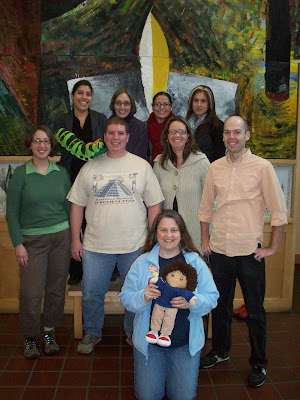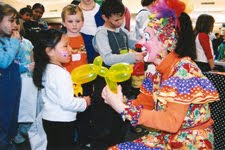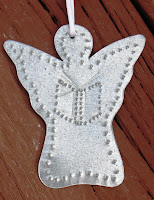A New Día Champion
In March, to recognize her impressive work to promote Día throughout the state of NM, we highlighted Flo Trujillo of Farmington, New Mexico as our first Día champion featured on this blog. I have the good fortune to meet committed Día supporters all over the country. As the year ends, I’d like to recognize Ana Schmitt, who in typical Ana style, insisted that any recognition needed to go to their LIBROS staff at Multnomah County Library, winners of the 2002 Mora Award. Ana and her colleagues are full of Día ideas.
1. Tell us about the work that you and the rest of the LIBROS group do. How did LIBROS get its start? How many people are part of the LIBROS staff?
LIBROS is a systemwide initiative at Multnomah County Library that connects the Spanish-speaking community with library services. It makes services available within its libraries and in the surrounding community to a population that is underserved because of cultural and language differences. LIBROS got started backed by the Library Services and Construction Act (LSCA) grant; MCL hired a Spanish-outreach specialist to coordinate the program and to expand library services to Spanish-speaking Latino children and their families. A survey sent to community agencies, school programs, and members of the community identified information needs and obstacles to library use. Their findings showed, among other things, a lack of understanding by Latinos about the role of the library and its mission (public libraries were practically non-existent in most Latin American countries); lack of Spanish-language materials in the collection; lack of adequate programming for Spanish speakers; the existence of a transportation barrier which prevented access to the library; and the inability of library staff to communicate, verbally and culturally, with the Spanish-speaking patrons.
LIBROS began in 1998 and since then has been responsible for numerous changes to improve service to Multnomah County Library’s Latino community. During the first year of the LIBROS program, more programs for Spanish-speaking families were established, including bilingual storytimes at three of its branches; a collection of Spanish and bilingual books was created; and connections were made with other youth outreach programs for summer reading programs. In addition, library-card campaigns, library tours, parenting programs and presentations about the library were made available to agencies serving children and to local schools. Since it began we have increased the number of bilingual Spanish employees from one person to more than 30 employees in 11 of our 18 locations. The outreach staff makes contacts with the Latino community through our events and programs for adults and children both in the library and in the community. These include:
• Spanish and bilingual storytimes
• Computer classes in Spanish
• Intercambio language exchanges
• Regular music and craft programs in Spanish
• Parenting and literacy classes for adults and children
• Special events like Hispanic Heritage and Día de los Niños
2. Please share your 2010 Día plans with us. Are you trying anything new?
For Día 2010 Multnomah County Library is planning 8 celebrations at multiple Spanish bilingual library locations. Each celebration will have 1 live performance as well as students’ group performances from local schools. We will have 2-5 literacy activities and a few crafts at each celebration.
In an effort to continue to make Día more literacy oriented we are trying something new and different for 2010. We are planning to gather around a book character and listen to stories. We will have Latino leaders from the community read to the children. And we will be having 20 minute parents’ workshops during Día. 1-2 workshops per location targeted to 0-6 years old, and another one to elementary school age children. For instance, we’ll share and show the 6 Early Literacy skills and give parents resources to use at home like ideas to help their child get ready for school and a print out of CDs and children’s books from the library collection.
o Make sure you have early literacy activities and performers that reflect the culture of the community.
o If your location is near schools (Head Starts or elementary), it might make sense to plan your celebration on a weekday. Talk with local teachers prior to see about possible weekday attendance.
o Promote your Día inside your library and out. Promote it during Storytimes and other events as well as through local schools, housing complexes, media, and in any other way possible.
o Get lots of help for the day of the event.
o Involve your community and include cultural components that draw the immigrant populations you want to reach.
Ways to involve the community include:
Having volunteers to prepare for Día de los Niños activities and events as well as to help on the day of the event.
Making Milagros, piñatas or other crafts to be displayed in the library is helpful in involving schools, children, and through them, families. Students’ creations could be exhibited in the library before, during and after Día de los Niños. Families will come to the library to view them.
Including local businesses strengthens community relationships and expands the resources available for Día de los Niños. Community businesses could donate raffle items, food, services and cash.
Having service providers with resources and education to share. The neighborhood police chief could host a craft table, firemen could give tours of their truck and educate kids about fire safety, and health services providers could bring health games and information.
Having after-school Ballet Folklórico classes perform is free and delightful for everyone.
Since bilingual households are diverse, and there are many different communities with many different immigrant populations, it follows that the choice of performers or other cultural elements will be unique for each community.
4. What’s the best part of your work?
Helping patrons find the information and materials they need as well as providing programming and events which they enjoy and that promote literacy and welcome them to the community.
Seeing the joy on people’s faces as they participate in programs and crafts at our events.
Introducing everything that is wonderful about the public library to folks who have not had access to a library before — board books, information on school subjects, learning English materials, computers for job-hunting, typing up school reports, etc.
We love books and enjoy sharing that joy for books and libraries through fun storytimes and encouraging kids to read whatever they’re interested in. Día is a wonderful way to reach out to the community, make families feel welcome and enjoy all the library has to offer while they connect with the community.




Comments
A New Día Champion — No Comments
HTML tags allowed in your comment: <a href="" title=""> <abbr title=""> <acronym title=""> <b> <blockquote cite=""> <cite> <code> <del datetime=""> <em> <i> <q cite=""> <s> <strike> <strong>